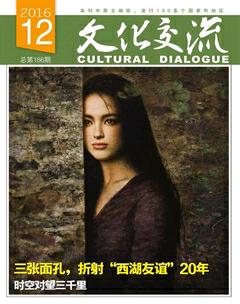三張面孔,折射“西湖友誼”20年
戚永曄
20年,43個國家,599位外國友人。
這些傲人的數據,齊齊指向的,是浙江省人民政府為表彰外籍專家在浙江省經濟建設和社會發展中所作出的突出貢獻和奉獻精神而設立的最高獎項。
為紀念西湖友誼獎設立20周年,特別設立了西湖友誼杰出貢獻獎,授予了3位外國專家,他們分別于1997年、2003年、2006年獲得西湖友誼獎,并在獲獎后一直留在浙江,為這片土地默默奉獻,他們代表了不同時期在浙外國專家的風貌,也是中外友好交流的縮影。
最“資深”獲獎人:“喜歡他們喊我‘老西”
今年85歲的俄羅斯人西特里維·德米特里·尼基弗諾維奇有個綽號叫“老西”。在他工作的巨化集團,同事們都喜歡這么稱呼他。而“老西”也很喜歡這個稱呼,他說,這讓他有了一種融入的感覺。
當從浙江省委副書記、代省長車俊手中接過西湖友誼杰出貢獻獎的獎杯與證書時,西特里維激動地表示:“1997年浙江省政府頒發給我西湖友誼獎,今天又頒發給我西湖友誼杰出貢獻獎,我感到萬分榮幸。感謝省政府對我們貢獻的高度評價!”
1992年,俄羅斯化學領域的最高科研機構——成立于1919年的應用化學研究院(現更名為俄羅斯應用化學科研中心)應邀派出專家組來到巨化,與中方合作開展當時尚處于創業階段的氟化工項目建設。時年61歲的老西作為該院設計院的院長助理,第一次踏上了日后成為“中國氟都”的熱土。當時,他并沒有想到在此后的20多年里把自己的心血都奉獻給了這里。
在此之后,西特里維數十次飛越歐亞大陸,奔波于中俄兩國之間,搭建國內廠家及科研單位在俄羅斯交流與合作的橋梁。至今,中俄雙方已在巨化中俄技術合作園進行了10多個項目的成功合作。
20多年愉快的巨化工作和生活,也讓很多巨化人都知道這位慈祥安靜、滿頭白發的老人是來自俄羅斯的氟化工專家。只要身體和時間允許,單位的領導和同事時常會陪西特里維外出游玩,陪他登山、釣魚、摘橘子……很多相處多年的氟聚合物事業部員工都和他成了好朋友,常年為他服務的同事們更是與他親如一家。西特里維的司機王曉全說:“要是不會點俄語,和老西交流會不順暢,所以這些年下來,我自學了點俄語的日常用語。”
盡管身處異國他鄉,但西特里維說:“從沒感覺到孤獨,要是問我是中國同事給我的關心多還是俄國同事給我的關心多,那很顯然,是中國同事給予的多——中國人更看重感情。”
老西勤勤懇懇、盡職盡責的工作得到政府部門的褒獎:1997年獲得浙江省西湖友誼獎,1998年獲得國家友誼獎;2000年獲得中華人民共和國永久居留權——這在當時整個浙江省僅有7人;2004年被選為浙江省首位外籍勞動模范;2010年榮獲全國人民友誼貢獻獎……作為優秀外籍專家和中俄友好人士,西特里維多次受到黨和國家領導人的接見,每次他出現在中央電視臺的新聞聯播節目中,都能讓巨化的同事、朋友歡欣鼓舞。
最“遙遠”獲獎人:“中國圓了我的夢”
如果說老西以年齡和生活在浙江的時間長、榮膺最“資深”獲獎人的話,那么離家最“遙遠”的,就非克勞斯·菲爾特莫屬。這位83歲的德國人,在杭州和柏林之間往返長達22年,每次都經歷至少12個小時的飛行,但杭州確實是他一直勾留、不舍離去的地方。
這位原國際賽艇聯合會器材委員會主席,幫助了一個家庭作坊式的工廠變成了全球最大的專業賽艇制造企業“浙江華鷹控股集團”。扎根杭州多年,他用自己的睿智和德國人的誠懇,和浙江人一起鑄造出“Made in China”,雅典、北京、倫敦、里約奧運會的比賽用艇。
來中國之前,克勞斯·菲爾特就有一個心愿:尋找合適的合作伙伴,造出世界上最輕、最快、造價低廉的賽艇。1995年,一次偶然的機會,杭州飛鷹船艇公司與克勞斯有了接觸。“我感覺,這是一個實現我夢想的契機。”
從那時開始,克勞斯就開始了他在杭州的生活:“最大的感受就是中國政府的開明和政策的開放,這里是投資和工作的好地方。”而他也用實際業績回饋中國人:國內外運動員,用他設計的“無敵”賽艇,獲得了包括世界冠軍在內的300多塊金牌。2003年至2004年,“無敵”賽艇成為雅典奧運會賽艇唯一中標產品,從此,世界賽艇產品才有了“富陽制造”。也是在那兩年,克勞斯先后獲得西湖友誼獎和國家友誼獎。
接受采訪中,克勞斯始終流露著對第二故鄉中國的深厚感情:2008年四川遭受地震之災時克勞斯身在德國,他坐立不安,多次致電杭州的工作伙伴詢問災區的救援情況,并慷慨解囊,為災區捐款。
當北京奧運會圣火在杭州傳遞時,克勞斯也是火炬手之一,他曾對媒體說:“我要通過祥云圣火把自己的祈禱和祝福帶給災區人民,中國人給我的感覺一向樂觀和堅毅,相信他們一定可以很快渡過難關!”
“這些年來,我總是傾我所有,力求能把自己畢生的研究和經驗傳授給中國的工程技術人員,看到親手參與建設起來的現代化企業,目睹中國的快速發展。”克勞斯動情地說。
最“融入”獲獎人:“我的中文講得可溜了”
如果有人問三位專家里哪位最融入中國文化,那無疑是64歲的印度人庫瑪,原因很簡單,他說的中文最溜。
作為浙江農業科學研究的帶頭人之一,他帶領團隊突破了無菌培養等技術瓶頸,大大提高了生產效益。這些成績的背后,其實是庫瑪及其團隊的充分融合、通力協作。
2002年,受浙江省農業科學院之邀,曾在印度建立年產1000萬出口組培苗實驗室的庫瑪來到省農科院植物組培中心工作。“省農科院做組培研究有20多年了,但是產業化能力不足。我們邀請庫瑪作為專家來指導。”院長陳劍平說。
大家沒想到的是,這位印度博士一點都沒有架子,很快和大家打成一片,幾年工夫下來,從不會說一句中文到能吃很辣的四川火鍋,用筷子夾花生米,說很順溜的中文……
“每年春節,庫瑪都會跟我或陳劍平到我們的家鄉過年。”省農科院蔬菜研究所副所長徐志豪說,“他喜歡放鞭炮、包餃子,有時也跟著我們走親戚,很享受中國式的年味。”曾有一家外省企業欲高價挖走庫瑪,被庫瑪回絕。對杭州、對省農科院這個大家庭,庫瑪已產生深厚的感情,“未能拋得杭州去,一半勾留是此湖”,他多次表示想加入中國國籍,終老杭州。
而他帶領團隊的能力也是有目共睹的,針對組培中心污染率高、產業化能力不足等問題,庫瑪進行技術攻關,將污染率從15%降到5%以下,相同產值利潤增加近10%。“沒有庫瑪,就沒有這個產業。”徐志豪說。2009年,庫瑪和老西、克勞斯一起被授予國家友誼獎榮譽稱號,這是一個外國人在中國能夠得到的最高榮譽。
確如浙江省委副書記、代省長車俊說的那樣,“人才興則事業興。未來的競爭是科技的競爭、創新的競爭,更是人才的競爭。”外國專家們在浙江創造價值、建立功勛的同時,也把浙江友誼的種子撒向世界各地。
(本文照片由作者提供)
The year 2016 marks the 20th anniversary of Zhejiang West Lake Friendship Award. Over the past 20 years, 599 foreign experts from 43 countries have been awarded the special honor for their contributions to the economic and social undertakings of the province.
To mark the 20th anniversary of the award, Zhejiang issued a special award to three experts who received West Lake Friendship Award respectively in 1997, 2003 and 2006. What makes them special is that they have continued their work in Zhejiang since the first awards. They not only make contributions to the provinces economic and social growth, but also embody the ties between China and the rest of the world.
The three honorees are Sityvi Nikivlovich, Klaus Filter and Aanil Kumar.
Sityvi Nikivlovich is 85 years old now. His colleagues at the Juhua Group in Quzhou in southwestern Zhejiang call him Old Si. Old Si loves the endearing name because it enables him to feel the intimate bond between him and his Chinese colleagues.
At the age of 61, he came to China in 1992 to help Chinas emerging fluoride industry. He was not to know that he would spend the next 20 some years contributing to the fluoride industry of China. He shuttled back and forth between China and Russia, building up ties between Chinese manufacturers and research institutes and their Russian counterparts. At present, the two countries have carried out more than ten projects at the China-Russia Tech Park in Quzhou.
Old Si has been working fruitfully and living pleasantly in Quzhou for more than 20 years and he is a celebrity in Quzhou. His colleagues take him around for sightseeing. Old Si has made quite a few friends, including his colleagues and those who provide services at home. Wang Xiaoquan, his driver, now speaks some Russian. He has been working for Old Si for years and knows the importance of the Russian language. So he has managed to pick up some Russian phrases and words.
Old Si received Zhejiang West Lake Friendship Award in 1997, the Chinese Government Friendship Award in 1998. In 2000 he received the green card for permanent living in China. This was quite rare, for he was one of the seven foreigners in the province who had been granted the privilege. He has received numerous awards and met with the top Chinese party and state leaders.
Klaus Filter is now 83 years old. For the past 22 years, he has shuttled to and fro between Hangzhou and Berlin numerous times. Before he came to Hangzhou, he had wanted to make a racing boat that was the lightest, fastest and cheapest in the world. In 1995 he came into contact with Huaying, a business that makes racing boats in Hangzhou. He realized that it was an opportunity to make his dream come true.
So he began his work and life in Hangzhou. Deeply impressed by the wisdom and good policies of the Chinese government, he considers Hangzhou an ideal place for investment and entrepreneurship. His dedication has paid off. Wudi Brand racing boats have won more than 300 gold medals in various competitions including many at the world level. In 2003 and 2004, Claus Filter was respectively awarded West Lake Friendship Award and Chinese Government Friendship Award.
The 64-year-old Aanil Kumar speaks Chinese fluently. The Indian is an agriculture scientist who came over to Hangzhou in 2002 at the invitation Zhejiang Academy of Agricultural Sciences. He had worked in a lab in India specialized in plant tissue culture. The academy in Zhejiang had been in the tissue culture project for two decades but its capability of turning research results to industrialization was inadequate. Kumar has helped. He has solved problems such as pollution in tissue culture and inadequate industrialization. The pollution rate dropped from 15% to 5%, raising profitability by 10%. “The industry would not flourish but for Kumar,” commented a colleague at the academy. Kumar received Chinese Government Friendship Award in 2009. One of the biggest pleasures Kumar enjoys in Hangzhou is to spend Spring Festival with at a colleagues home.

